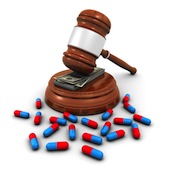
According to the consumer watchdog group Public Citizen, approximately 80 percent of prescriptions in the United States are filled with generic versions of drugs. The Supreme Court’s decisions leave victims of defective drugs with few avenues of recourse.
The Underlying Lawsuit: Mutual Pharmaceutical v. Bartlett
The June 24, 2013 decision overturned a multi-million dollar jury award in the case Mutual Pharmaceutical v. Bartlett, a lawsuit where a patient suffered horrific injuries after using the drug Sulindac. The drug, a generic version of Clinoril by Merck & Co., is a non-steroidal anti-inflammatory. Ms. Bartlett suffered a rare but serious skin reaction called toxic epidermal necrolysis and her skin began to peel off, leaving her severely disfigured with burn-like lesions over two-thirds of her body. She spent months in a coma, a year being fed by a tube, and will need medical care for the rest of her life. She has also been left permanently disfigured and nearly blind.
At the time Ms. Bartlett received her medication, the drug’s label did not specifically warn about the risks of toxic epidermal necrolysis (however, the FDA later required the information to be added to warnings for all drugs in that class of medicines). Because the Supreme Court had previously ruled that generic drug manufacturers could not be sued for inadequate safety warnings, Ms. Bartlett’s lawsuit was based on the claim that Sulindac was defectively designed, a tort cause of action under the law of the state of New Hampshire. The Supreme Court held that Sulindac had been approved by the FDA, it was basically determined to be safe under federal law. As a result, any claim that the drug’s design violated state law could not stand where it was in direct conflict with federal law. This is known as pre-emption, where federal law trumps all state laws that are in direct conflict with it. The same doctrine has been in the news for topics such as immigration reform and gun control.
Another Blow to Victims of Defective Drugs
The Mutual Pharmaceutical decision strikes another blow against patient safety. Although people injured from using brand name drugs can sue for claims of design defect or failure to warn, they cannot sue if they had been prescribed a generic version—even the drug formulations or warnings are exactly the same. Side effects of prescription medications are often not discovered until decades after they have been on the market. Once the patent on a drug expires and other companies are free to manufacture generic versions, those companies have no incentive to monitor the safety of the drugs they sell because it is difficult to hold them liable if they make no changes to the drug itself or the warnings that come with it.
Nor do these generic drug manufacturers have an incentive to pull defective drugs from the market unless the FDA forces them to do so.

Four Supreme Court Justices disagreed with the reasoning of the majority and explained why they believe the result is incorrect, though this will be little comfort to the thousands of people who are injured when drug makers withhold safety information. Yet in some cases, generic drug makers can be held responsible, and depending on the circumstances, law firms will take such cases. Options for what can be done for people unfairly injured by a generic drug will be discussed in a later post.
